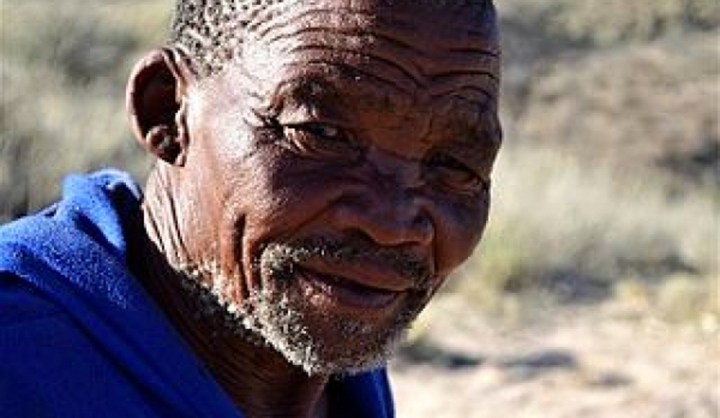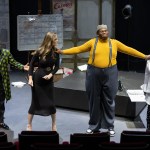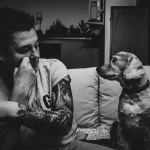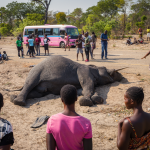Maverick Life, South Africa
GroundUp: Free speech vs. copyright – battle over San legacy on the steps of the Labia

An old dispute over representing the family legacy of Khomani San leader Dawid Kruiper has resurfaced in a public furore between writer Patricia Glyn and filmmaker Richard Wicksteed. By DANEEL KNOETZE for GROUNDUP.
Glyn and Wicksteed, one-time colleagues on an April 2011 journey of discovery with Kruiper – documenting his family’s return to land of their forebears in the Kgalagadi Transfrontier Park – have become enemies in a dispute over the dissemination of footage filmed during that trip. Kruiper died in 2012, adding to the gravitas of the interviews captured by Wicksteed.
The dispute climaxed on the steps of the Labia theatre in Orange Street on Monday last week. Wicksteed had arranged to premiere his new documentary In the Land of Ou Makai – a Bushman Odyssey at the theatre. Yet, with audience members already gathered for the evening screening, Glyn arrived with lawyers from law firm Webber Wentzel in tow and reiterated accusations of copyright infringements against Wicksteed. When she threatened that the theatre’s screening would also be in breach of her copyright to footage in the film, Labia owner Ludy Kraus decided to cancel the premiere.
“We were unaware of the copyright dispute, or the details thereof,” Kraus said.
“I did not want to put the Labia into a position of being sued. When the country’s top copyright attorneys showed up, we took it as a serious threat. Once the dispute has been sorted out, we would happily screen the film at a later date.”
At the Labia and online the film’s supporters rallied against Glyn. They accused her of “censoring” the San’s heritage and deplored the Labia for buckling under the mere threat of future litigation – sentiments echoed by Wicksteed, who accuses Glyn of intimidation in an ongoing bid to appoint herself as the “sole channel” for the voices of deceased leaders of the Kruiper clan.
Wicksteed’s film is the culmination of 15 years of footage, interviews and documentation of one of the last enclaves of Khomani San people living in South Africa. It is his third feature film on the subject, and most of the footage and funding for the documentary was filmed and raised independently of the 2011 expedition.
Watch: The teaser for In the Land of Ou Makai – a Bushman Odyssey:
The documentary tracks the family history Dawid Kruiper, a Khomani San elder and custodian of cultural knowledge. The film traverses the space between historical documentary, journalism and ethnography and tracks the San’s experience as victims of genocide during colonialism, marginalisation during Apartheid and their attempts at land and cultural restitution after 1994.
Running alongside this broad narrative is a more intimate story of Wicksteed’s relationship with Dawid Kruiper and his family, and the contemporary struggles of the Khomani San in the border regions between South Africa, Botswana and Namibia.
The ‘Ou Makai’ of the title refers to Kruiper’s grandfather, a respected San leader and warrior who fought alongside Nama militias against the German colonialists’ military campaign to exterminate South West Africa’s indigenous people in the early 1900s.
The climax of the documentary was filmed by Wicksteed, during his 2011 expedition with Glyn, at old battlegrounds and sites of historical significance for Ou Makai and the Kruiper family. In one scene, under a tree in the Kgalagadi Transfrontier Park, Kruiper makes a vivid and horrifying revelation about scenes Ou Makai witnessed at that very spot during the war with the Germans. Sworn to secrecy as children by their grandfather, that and other stories have been buried in the Kruiper brothers’ memories for decades. The revelations were discussed in Glyn’s book on her experience with the Khomani San and the 2011 expedition. They partly informed the title – “What Dawid Knew”.
Wicksteed, owing to his long standing connection to the Khomani San, was brought on board to film Glyn’s expedition after her first choice filmmaker was injured in a car wreck en route to the Kgalagadi. It is the pair’s last minute contractual agreement which lies at the centre of the current dispute.
Glyn claims that she “employed” Wicksteed and therefore she owns the copyright to 2011 footage. Wicksteed challenges this claim, saying that he was contracted not as an employee, but as an independent filmmaker and that Glyn’s funding for the film documentation was R40,000 short of what was needed – money he invested from his own savings.
“In terms of our contract, I have explicit right to make use of the expedition footage in any way I wish within my own documentary. Any suggestion that I would have dropped everything and travelled to the Kgalagadi to produce and direct footage at a loss for Glyn’s personal use, without the expectation to make my own film, is utterly preposterous,” Wicksteed said, adding that the dispute is a contractual one and not related to copyright. What’s more, Glyn has never followed through on her threats to take him to court, Wicksteed said.
Meanwhile Oupa Jan Pietersen, a Khomani elder and Kruiper’s son-in-law, has steered clear from giving explicit support to either faction.
“I think it is time that Patricia and Richard come and sit down with us together, and we must speak this thing through. It is not good that this dispute is happening without our input, because the Kruipers worked together on this project,” he said.
Yet, asked about his personal views on the pair, he expressed trust in Wicksteed as the Khomani San’s resident filmmaker, while questioning some of Glyn’s methods – her tendency to exclude certain Khomani people’s voices and a lack of “transparency”.
“Some of us saw the film when Richard screened it for us a few weeks ago, and many people liked it. But I think we should show it again at the Kalahari Desert Festival (later this month) and ask everyone what they think. We need to have a lot of input from many people, before we can give an answer about where we stand as the Khomani San,” he said.
Glyn declined to comment when contacted by GroundUp and referred to her statement uploaded to Facebook after the incident at the Labia. She pointed to a number of other “unresolved issues” and complained that Wicksteed had finalised the film and planned a screening nonetheless. DM
This feature was first published at www.groundup.org.za.
Main photo: Dawid Kruiper. Wikipedia user The Triplet says this was taken at Askham in September 2011. (CC BY 3.0)

















 Become an Insider
Become an Insider